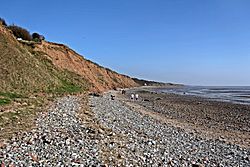Dee Cliffs facts for kids
| Site of Special Scientific Interest | |
 |
|
| Area of Search | Merseyside |
|---|---|
| Coordinates | 53°20′35″N 3°09′04″W / 53.343°N 3.151°W |
| Interest | Geological |
| Area | 14.39 hectares, 35.55 acres (143,900 m2) |
| Notification | 1979 / 1983 |
The Dee Cliffs are a special place found on the eastern side of the Dee Estuary. They are located near Thurstaston on the Wirral Peninsula in England. This area is so important for its nature and geology that it's been named a Site of Special Scientific Interest (SSSI). This means it's protected by law because it has unique plants, animals, or geological features.
Contents
Discovering Dee Cliffs
The Dee Cliffs are mostly made up of clay, forming tall banks that are quite rare to see in the Merseyside area. Imagine walking along the coast and seeing these amazing natural walls! They tell a story about how the land was formed over thousands of years.
What Makes Dee Cliffs Special?
This SSSI is protected because it's home to some very important natural features.
Clay Cliffs and Banks
The main reason Dee Cliffs is an SSSI is its amazing clay cliffs and banks. These are the best examples of this type of landform in the whole of Merseyside. They show how the land has changed over time due to natural processes like erosion.
Marl Pits and Wildlife
Besides the cliffs, there are also some old "marl pits" here. Marl is a type of soil that's rich in clay and calcium carbonate. These pits have become small ponds or wetlands over time. They are full of life, with many different kinds of plants (called flora) and animals (called fauna). It's like a mini-ecosystem thriving in these watery spots.
Rich Grasslands
You'll also find areas of "herb-rich neutral grassland" at Dee Cliffs. This means there are fields with many different types of wild flowers and grasses growing there. These grasslands are important because they provide food and shelter for insects, birds, and small animals. They add to the rich variety of nature found in this special area.
Gallery





